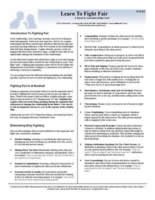All Couples Should Learn To FIght Fair. Here's How
Check out our mini-guide on how to fight fair, and stop letting badly handled conflict cause pain in your relationships. Download it NOW!
Learn about the most common errors managers make related to disciplining employees
Five Sins Of Discipline by Robert Bacal
Summary: Most managers, at some time in their careers, will have to discipline employees for the purposes of performance improvement. When employee discipline is done properly, it doesn't have to result in hurt feelings or resentment. When it's done poorly, it's often seen as unfair, and can actually cause poor performance. Learn about the process of progressive discipline.
Perhaps the most pleasant task for supervisors and managers is the task of disciplining an employee. While some staff seem to think that managers take some perverse pleasure in the process, the truth is that it is usually dreaded, and often done in an ineffective way. Part of the reason why this is so is that there are some psychological factors in play that militate against constructive discipline processes.
In this article we will be identifying some common errors, and helping you to formulate an approach to discipline based on sound principles.
Error #1: Discipline As Punishment
Perhaps one of the most prevalent errors is based on the idea that discipline is punishment. The manager that perceives discipline as a punishment process tends to apply negative sanctions, expecting that those negative sanctions will have some sort of positive effect; for example, to eliminate the unwanted behavior simply through the "threat" of additional sanctions.
Unfortunately, the use of negative sanctions on their own, bring about unpredictable results. In rare cases, they may work, through the fear factor. In other cases, they have an effect opposite to the one intended, and can contribute to escalation in the manager-employee relationship. Why? Because negative sanctions will only succeed when:
-
the employee values what is taken away or fears what is threatened.
-
the employee sees the sanction as fair, and consistent with the "offense".
-
the employee acknowledges and respects the right of the manager to impose the sanction.
-
Unless these three elements are in place, employees respond to punishment with resentment, and counter-attacking, either covertly or overtly.
What is the alternative perspective? The alternative perspective is to consider discipline in it's original sense, as an opportunity for the employee to learn. The traditional notion of a disciple (same roots) is of a person who learns from one s/he follows. Discipline, in this approach focuses on what the employee must learn in order to bring his/her behavior in line with the needs and expectations of the organization.
Before we leave this for the moment, we need to be clear. Discipline, even in a learning sense, must, at times have "teeth". It just isn't ONLY teeth.
Error #2: Discipline As An I-You Confrontation
A second error is that some managers see discipline as something done TO an employee, not something done with an employee. Perhaps we must consider a hard reality in the government workplace; it's pretty difficult to do anything TO an employee without getting wound in trails of paper, documentation, and investment of time. Even then it can be to no avail.
We suggest that you consider discipline as requiring you and the staff member to work together to solve a problem. The fundamental task, when possible, is to create a situation which encourages the staff member to work with you to identify causes of problematic behavior, and to take action to correct those problems.
Discipline needs to be a "we process".
Error #3: Too Late, Too Late
It's probably safe to say that managers do not go hunting for disciplinary problems. Lord knows, you have enough other things to do to look for trouble. Sometimes, though managers are TOO slow to respond to an emerging issue or problem. There are a number of reasons for this:
-
tendency to see an emerging problem (e.g.. a first instance), as a quirk, a fluke, or accident, and something not worth addressing.
-
desire to have harmony
-
perception that discipline is a cause of disharmony
-
simple dread
The reason why delay is problematic is that it sends a message that undesirable behavior will be accepted or even not noticed. Second, delay can have an adverse effect on the manager later, if the problem increases in frequency and intensity so it cannot be ignored. When a problem is allowed to grow, the manager often will develop an emotional set towards the employee that makes constructive interaction difficult. To be blunt...managers get pissed off, at repeated "offenses" even if the manager has done nothing to stop them.
It is very important that inappropriate behavior or actions in the workplace be, at minimum, noted, and the fact communicated with the staff member, right at the first occurrence. This need not be a lengthy difficult discussion, particularly if the event is relatively minor. The really lengthy, unpleasant discussion tend to occur as a result of not addressing problems early on.
Error #4: A Non-Progressive Approach
Related to the previous point (Error #3) is the issue of progressiveness, or lack of it. Progressive discipline starts with the least possible use of power and disciplinary action, and over time, will involve stronger actions, if the situation continues.
Managers who delay disciplinary action tend to wait until action must be taken, when the situation has become so severe that it must be addressed immediately. Often the manager feels the need to apply harsh sanctions, because, perhaps the inappropriate behavior has become more extreme.
Non-progressive measures (harsh initial action),when applied to a long time, but not addressed problem, often seem too harsh by the employee, and on occasion, by their coworkers.
A key here is to start with least forceful action as early as possible, unless of course the offense is so severe that it requires immediate harsh action.
Error #5: Missing Root Causes
It is understandable when beleaguered and frustrated managers/supervisors "lay down the law" to a problem employee. In some cases, a problem employee may require this kind of approach particularly if they have the skills to do what is desired, but have not been applying the skills for one reason or another, related to motivation. But in many situations, exhortation, threats, or an offer of positive rewards may have little effect on behavior, simply because they do not address the root causes of the problem, and leave the employee "on their own" to figure out a solution.
Sometimes an employee is not succeeding because they lack the skills (even if they are not aware of the skill deficit). Sometimes an employee is not succeeding because they have underlying personal or psychological problems. And, sometimes an employee is not succeeding because the system in which s/he works is not set up to engineer success.
Without knowing the root causes underlying a performance problem it will be difficult to work with an employee to improve that performance.
Conclusion
It may sound like we are advocating a kid gloves approach to problem employees--we are not. What we are saying that it makes little sense to do things that are likely to fail, and a punishment approach is likely to fail more often than not.
 Manage Conflict - Resolve Conflict - Prevent Conflict
Manage Conflict - Resolve Conflict - Prevent Conflict 

